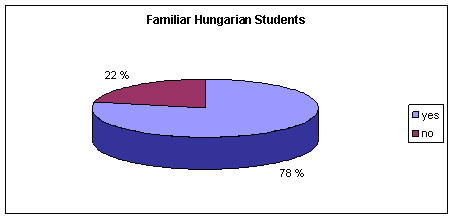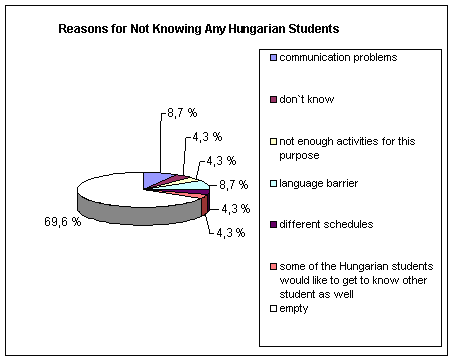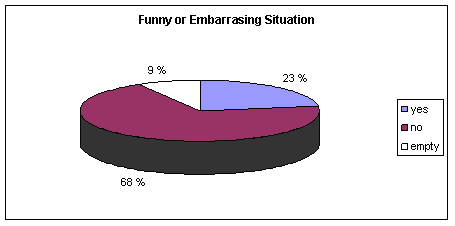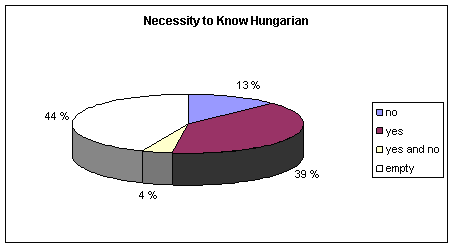![]()
NEEDS ANALYSIS
REVIEW |RESULTS | QUESTIONNAIRE | SHORT QUESTIONNAIRE
Germany | United Kingdom | Hungary | Finland
Results of the Needs Analysis Carried out at Pécs University
A. Background Questions | B. Proficiency in Hungarian | C. Questions about studying | D. Questions about everyday situations | E. Social life and leisure | F. Important/essential vocabulary
1.
Have you got to know any Hungarian students? (only 23 questionnaires)

2. If you have, where and how (through studies, leisure activities, hobbies etc.) Did you get to know them? (only 23 questionnaires)

3. If you have not to know any, why do you think that is? (only 23 questionnaires)

4. Have you ever found yourself in a situation in Hungary that was funny or embarrassing because you broke a Hungarian cultural convention? (only 35 questionnaires)

5. If so, please describe the situation. (only 12 answers)
- There is a tradition of not hitting beer glasses together when wishing „egészségedre” (= ’cheers’) at a table but this is hardly embarassing for foreigners. (M25, Greece– answered „no” to the previous question)
- Once I had to cross the room of a restaurant that was full of people dancing in a funny way (for me!) at a wedding party. I had to dance through them! (M21, Greece)
- In shops after paying you just have to get lost and pack your things on the other table. (M26, Finland – previous question left empty)
- I consider no significant differences between Hungary and other European countries. Every country has its own specific cultural behaviour but I don’t think that there are „big” conventions that can be broken fundamentally. I believe that, as a foreign student, you should adapt to the social manners of the country you are staying in. A big difference with Belgium, e. g., is that the average income in Hungary is much lower – considered as a ’convention’ here. But I don’t think that I should therefore live as a wealthy person. My amount of money is more or less as big as the amount for a Hungarian student, and I don’t want to spend more than I need to spend. So, for me, there are no real conventions in general (at least not at a first notable view after a two-months-stay here). (F20, Belgium – answered „no” to the previous question)
- The only instances such things have occured in one due to the language barriers. When I first arrived here I didn’t really know how the bus system worked and the rules of it. Mostly though, there have only been funny or embarassing situations because of my lack of knowledge of the language. (M19, Canada)
- Sometimes the Hungarian people make fun of my „poor Hungarian”. (F23, Israel)
- I´m not used to let girls go first into shops, buses or through doors in public places. (M19, Norway)
- Only the different holidays (M21, USA - previous question left empty)
- In the States, if you go into a clothing store and don’t buy anything, it’s okay. Apparently here it’s not because I went in a clothing store here, and tried on a jacket, and didn’t buy it, and the lady got mad. I guess I learned that you should only go into a store and try things on, if you plan on buying something. (F18, USA)
- I used to always go outside in winter with wet hair and my Hungarian friends parents would drag me back and blow dry my hair! (F19, USA)
- We ordered -ség (= suffix ’-ness’) instead of sõr (= ’beer’) at the restaurant. (F25, Norway)
- Instead of saying „zarva” which means ’closed’ ” for four years I have said „szarva” which means ’shitty’. (F24, Norway/Afghanistan)
- empty (23)
6. a) Is it necessary to know Hungarian in order to obtain information about leisure activities or to participate in them? (only 23 questionnaires)

6. b) Why?
- The only communication needed between me and Hungarians is to pay for the activity, altough it would have been a major plus to know Hungarian in some situations.
- Not necessary because you can ask in the English programme office.
- Yes, because all Hungarians speak Hungarian.
- It´s better if you know.
- A lot of people speak English.
- Because information about activities that are not in the English programme is only in Hungarian.
- It´s written always in Hungarian.
- Because all information is in Hungarian. (2)
- Because mainly Hungarians participate in activities. (3)
A. Background Questions | B. Proficiency in Hungarian | C. Questions about studying | D. Questions about everyday situations | E. Social life and leisure | F. Important/essential vocabulary